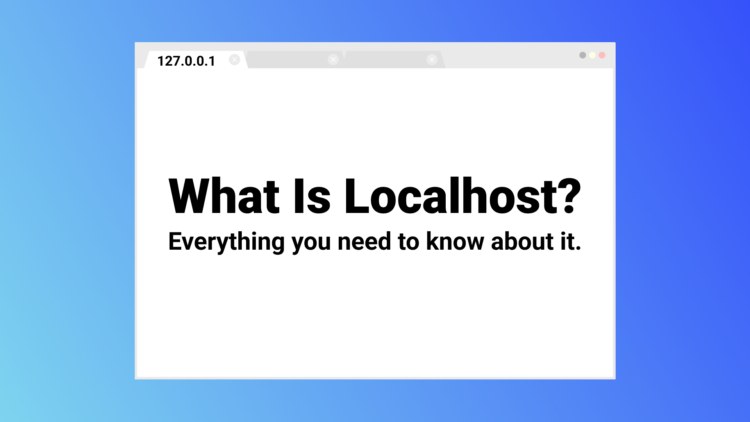- About Localhost
- 4 Benefits of Localhost
- Definition of Localhost Address
- What is the difference Between localhost and 127.0 0.1?
- 3 Main Uses of Localhost
- Setup network connection
- Conclusion
What is localhost? The vast amount of specialized computer terminology can be overwhelming and difficult for the average person to understand. In this article, we will talk about localhost and its corresponding IP address.
About Localhost

A common description of Localhost is the following:
“The localhost is the default name describing the local computer address also known as the loopback address. For example, typing: ping localhost would ping the local IP address of 127.0.0.1 (the loopback address). When setting up a web server or software on a web server, 127.0.0.1 is pointing the software to the local machine.”
Fine, but what does it mean?
When discussing computer networking, the term “localhost” is refering to the current device, so your own computer. This phrase can be more precisely defined as “the computer you’re working on.”
An IT professional, a network administrator, and programmers may also use the term “home” to describe the computer they are currently using. This usage enables them to access local resources and services without relying on external networks or the internet, streamlining the process of testing and debugging applications.
Localhost is a commonly used term in web development that refers to the computer or server that is hosting a website or application. It is essentially a virtual server that runs on the user’s own machine. Developers are using it for testing and development before deploying the website to a live server.
Developers frequently utilize localhost, particularly when building web applications or programs that need an internet connection.
4 Benefits of Localhost
Some benefits of using localhost include:
- Testing and Development:
Localhost provides a safe and isolated environment for developers to test and develop applications. It allows developers to simulate a live server environment without the risk of affecting a live website or application.
- Speed:
Since the application is running on the user’s computer, it eliminates the need to transfer data over a network, which can result in faster load times.
- Security:
By keeping applications on a local machine, it reduces the risk of external threats like hacking or data breaches.
- Cost-effective:
Hosting an application on a local machine is free, making it an affordable option for small businesses and startups.
Overall, using a localhost can be a convenient and efficient way to test and develop applications while ensuring security and cost-effectiveness.
What Is a Loopback Address?

A loopback address (also known as the loopback interface) is a special IP address that is used to send network traffic back to the same device that generated it. In IPv4, the default IP address is usually “127.0.0.1,”. IP addresses
Loopback addresses are often used for testing and troubleshooting purposes, as they allow a device to communicate with itself without needing to send traffic over a network.
Overall, loopback addresses are an important tool for developers and network administrators, as they provide a convenient and reliable way to test and troubleshoot network applications and configurations.
What is the difference Between 127.0 0.1 and localhost? What is Localhost? Explained for Beginners – MyThemeShop
127.0 0.1 and Localhost: What is the difference?
The loopback address, commonly represented as 127.0.0.1, is a reserved IP address range that includes over 16 million addresses. It facilitates the loopback function, enabling a computer to communicate with itself via network connection protocols.
Therefore, the loopback functionality of localhost enables a device to exchange network data with itself, making it useful for emulating network connections even when a physical network is not available or unreachable.
In practice, the terms localhost and 127.0.0.1 are often used interchangeably. However, it’s important to note that they are not strictly identical.
While on most machines they are functionally equivalent, localhost is a label for the IP address and can be routed to any IP address. A range of IP addresses from 127.0.0.1 to 127.255.255.255 is designated for creating local area networks.
3 Main Uses of Localhost

Localhost is useful for web development and testing purposes as it allows developers to test and debug websites and applications on their own computers, before releasing the website or application to the public.
It also provides a safe and controlled environment for testing, as the website or application can be tested without affecting the live website or application.
The 3 main uses of localhost:
1. Speed Testing
As a network administrator, it’s important to verify that all equipment and TCP/IP protocols are functioning properly. (Transmission Control Protocol/Internet Protocol) One way to do this is by sending a ping request to the loopback interface. This can help identify and troubleshoot any issues.
2. Testing Programs and Web Applications
Developers can utilize the localhost address to simulate a server for testing web applications and programs that require internet connectivity. By uploading program files to the local operating system, developers can assess the application’s performance and test various features before going live on the actual server, which is accessible by a broader audience.
3. Site Blocking
The localhost can be utilized to block access to unwanted websites by others. The loopback interface is beneficial for preventing the entry of malicious sites and other undesirable content.
What Do You Need to Set Up Your Local Hosting?
To set up local hosting, you will need to install a web server software such as XAMPP or Local on your computer. You need to choose software based on your computer’s operating system. Some might work better on the operating system of your choice.
Once installed, you can create and store your website files in the appropriate directory of the server. You can then access your website by navigating to “http://localhost” or the IP address of your computer in a web browser.
2 Softwares That Works on All 3 Major OS
- XAMPP – available here
- Local by Flywheel – available here (If you want to start a WordPress website check this)
Conclusion
Acquiring knowledge about localhost and its usage can expedite your development process. It enables you to store, test programs, and preview website elements without deploying them to your live server. Although there may be a learning curve involved, the outcomes are highly advantageous.
FAQ
They are commonly utilized for diagnostic and testing purposes since they enable a device to communicate with itself without the need to transmit traffic over a network.
IP addresses (Internet Protocol addresses) are unique numerical identifiers assigned to every device connected to the Internet, enabling it to communicate with other devices and access resources on the Internet.
A web server is a program or computer that stores and delivers web pages to users over the internet or a network.
You can access localhost by entering “localhost” or “127.0.0.1” into the web browser’s address bar, where you usually enter a website domain name.
Yes, you can use localhost to host a website for development and testing purposes, but it is not recommended for hosting a live website.
Loopback on a router refers to the ability to assign an IP address to the router using a loopback interface.
